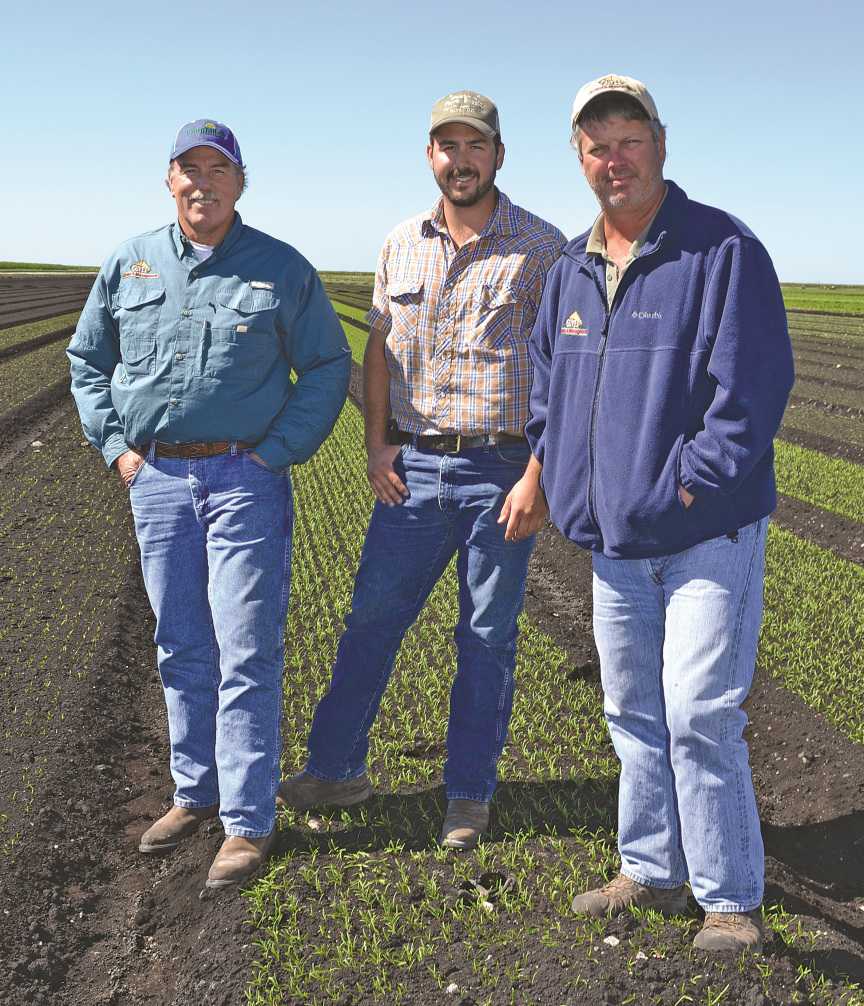Principles Of Success Propels Grower’s Management Inc.

[From left] Paul Orsenigo, Derek Orsenigo, and David Basore of South Florida-based Grower’s Management Inc.
“I started out on sheer passion and desire to farm on my own,” says Orsenigo. “But, the lettuce and leaf deal was a very volatile business. Back then, processing and packing of lettuce was in its infancy, so carton and commodity sales still dominated the market. We faced a lot of market spikes up and down and adversity from weather events.”
In 2000, Orsenigo began a partnership with David Basore to establish Grower’s Management Inc. (GMI). The new operation combined the experience of the two men and has grown with the help of a team of employees who can manage many different jobs. Paul’s son Derek works as farm manager at GMI and David’s son Davy works part-time gaining experience, while he pursues his education.
“Our people are multitalented, and on any given day, they might be doing five to seven different jobs,” says Orsenigo. “We take a lot of pride in our employees and we are proud that we strive to be good employers and give back to the local community.”
Try To Diversify
The volatile years of the 1980s and 1990s taught Orsenigo and Basore the importance of diversification at GMI. The farm now grows a variety of lettuces including Romaine, bibb, iceberg, butter, and more. Mixed leaf offerings include baby spinach, wild arugula, Chinese cabbage, endive, and more. The farm also produces green beans and sweet corn on mineral soils.
“Our markets have fragmented and diversified over the years,” says Basore. “The packaged salad deal has taken a larger part of our markets and you see shifts in demand year in and year out. We have placed a large emphasis on diversifying what we grow and cultivating niche markets. The mix of crops we have planted provides some insurance to all the wild rides in the market. It has gotten us through some tough years and allowed the operation to progress.”
Invest In Efficiency
“Another common thread in our approach is an ongoing investment in the business, whether it is upgrading equipment, employing new technology, or improving working conditions,” says Orsenigo. “When it is time to replace a machine, we don’t want to make a lateral move. We want to upgrade the equipment and improve efficiency.”
Investing in efficiency at GMI is more than just buying new equipment. Both Orsenigo and Basore enjoy tinkering with mechanics. “One of our major goals is minimizing handling of product, so David and I fabricated a spring mix harvester that eliminated the need for two people when compared to conventional machines,” he adds.
Precision agriculture is being used on the farm for auto-steer guidance to ensure straight rows and to fully utilize available land. Fertility mapping of fields also allows for more precise applications of fertilizer.
Proper grouping of equipment is an important part of GMI’s investment strategy. “We look for ways that we can get cross utilization out of equipment,” says Orsenigo. “We split our operation into three groups based upon equipment usage — sugar cane, green beans and corn, and our leafy mix. A lot of it is based on wheel spacing and implement configuration. We are specialized, but we are able to get multiple uses with the same equipment.”

Customer-First Mentality
Orsenigo says GMI’s business model strives to provide the best quality and diversity of products to its customers on a consistent basis.
“Looking back 15 years ago, we had about six to eight offerings when it came to packaging and counts,” says Orsenigo. “Today, we have expanded significantly and have about 40 different options. Customer ‘A’ wants 18-count in a box, while customer ‘B’ wants a 12-count in a reusable plastic container. It creates highly intense production and harvest, but you have to manage it all efficiently to meet the customer’s needs.”
GMI’s Principles Of Success

In addition to packaging, GMI partners with other local growers to fund a private lettuce breeding program to develop varieties better suited for Florida’s environment. “In addition to breeding for production and disease resistance, we focus on leaf color, texture, taste, and shelflife — all the things the customers are looking for.”
GMI works hard on achieving better arrivals for their customers. Orsenigo says reducing handling of the crops and proper pre-cooling is critical to achieve this. They’ve built their entire production and harvest approach around this. Hugh H. Branch Inc. has partnered with GMI for years, providing effective pre-cooling, sales, and shipping services.
All of GMI’s production, harvest, processing, and packaging undergoes scrutiny of third party-audits. The farm is upgrading technology in advance of the new year to meet the latest Produce Traceability Initiative milestone.Not surprisingly, food safety is one of the biggest areas of demand from GMI’s customers. “I believe that the focus on ‘buy local’ is largely driven by food safety concerns,” says Orsenigo. “Consumers want more and more to know where their food comes from and to be assured their produce is grown under safe conditions.”
“For us, producing safe food is an attitude and part of our working culture,” says Orsenigo. “It is part of everything we do every day.”
Engage And Educate
Orsenigo and Basore are firm believers that a grower’s responsibility extends beyond the farm gates. GMI has hosted many tours of their operation whether it is school groups, regulatory groups, businesses, and other associations.
“When we have the opportunity to have people come out to the farm, we welcome it,” says Orsenigo. “Sometimes people come in suspicious about farming, but usually it is an eye-opening experience and they leave with a more positive perception.”
Orsenigo has been an active board member of FFVA for years. “It is critical that growers are active in farm organizations to tell our story and the challenges we face,” he says. “We must communicate the importance of food security and promote American-grown produce.”










